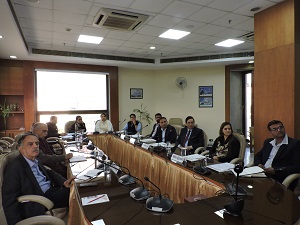On 16 December 2022, the Vivekananda International Foundation (VIF) organised a talk on “Power trading between India and Nepal”. Dr Arvind Gupta, Director VIF, gave the introductory remarks, followed by a presentation by Mr Lal Krishna KC, Sr. Advisor to the Energy Committee at the Nepal-India Chamber of Commerce and Industry (NICCI), Mr Kunal Kayal, Treasurer at NICCI and Neha Agarwal, Director of Arunachal Pradesh Power Trading Company.
India and Nepal signed a “Power Exchange Agreement” in 1971 to meet the power requirements of both the countries, in the border areas. It was only in 2014 agreement on ‘Electric Power Trade, Cross-border Transmission Interconnection and Grid Connectivity’ between India and Nepal and the “SAARC Framework Agreement for Energy Cooperation (Electricity)” was signed. This indicates a slow pace of the partnership between the two countries. Nevertheless, the following methods can be adopted to increase the pace of interaction between India and Nepal.
First, political will and political commitment will help utilise resources judiciously and help expedite in implementation of the projects for India and Nepal. Second, through policy planning and interventions, the pace for implementation of projects will increase. Third, the rules and regulatory measures must be harmonised and synchronised in the structural sphere to eliminate the grey area in cross-border and subregional energy trading. Fourth, the simplification of guidelines for power trading and online procedural access would create a synergy between both countries. Fifth, in the technical sphere, a set of procedures are required for a reliable transmission network across the country, which needs to be synchronised for the power flow. Finally, in financing, India has given grants and extended lines of credit for high-voltage line development to many countries, including Nepal. However, interest rates on lines of credit and Exim bank can be relaxed, and the private sector could increase investment. There is a requirement to focus on these areas of cooperation and require documented agreements between government-to-government and private-to-private actors for seamless bilateral interaction.
The discussion also proposed that transmission corridors could make cross border energy trading seamless in next five years. A promise of cooperation in open access energy engagement by both governments will bring in more private players that will prove beneficial to the overall climate change agenda and the economic prosperity of India and Nepal.








Post new comment